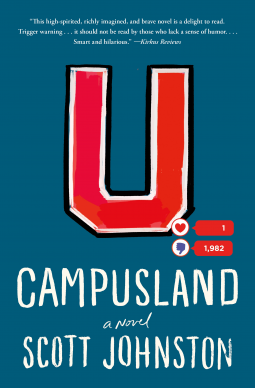Thank you to St. Martin’s Press for providing me with debut author Scott Johnston’s novel, Campusland, in exchange for an honest review.
Devon University is a “not-quite Ivy League” east-coast institution that has provided a quality education for generations. Through fond memories and rich traditions, Devon has built a strong group of wealthy alumni, who are happy to support their alma matter, as long as it continues to reflect the values they treasure.
However, there is a problem. The world is changing and life at Devon is beginning to reflect the most extreme state of these changes.
Campusland is a satire and it is laugh-out-loud hilarious. Johnston pokes at several issues, however important they may be, that have spiraled out of control due to a lack of common sense. For example, when Freshman student Lulu Harris takes a spill and is injured on campus, no one will believe her when she tells them the truth: she was not sexually assaulted. Instead of believing the truth, the situation escalates to the point that Lulu feels that she has to name an accuser and decides to point the finger at her professor, Eph Russell.
Lulu is complicated. She is a NYC party girl, who is stuck at a college far from the city and is feeling her status slip away. She has failed at making friends and can’t seem to catch a break. Lulu had a bit of a crush on Eph and his rejection stung, however she did not initially intend on blaming him or anyone else. She tried to tell the truth, but no one would believe her word. When she names Eph as her attacker, she realizes that she has an opportunity to promote her social status through a social cause. In a calculated move, Lulu starts a nightly ritual of crawling through campus. Lulu’s crawl is silent and she never speaks of her “assault,” however other people assume that she is making a statement and speaking on behalf of all sexual assault victims. Lulu becomes a sensation and she doesn’t correct any of the assumptions.
Currently, with so many powerful men being accused of sexual assault, there is such outcry at women not being believed when they are attacked, this shows the same problem in a reverse situation. Lulu was never attacked, but no one will believe her. She is only believed, when she becomes the victim that people want her to be. Her voice has actually been silenced by the very people who pretend to support her. It’s sick.
Eph, the true victim, is a white male from the South and he is helpless as his career go down the drain. Not only is he accused by Lulu, but prior to the Lulu situation, his course syllabus comes under attack by students accusing him of racism for teaching “The Adventures of Huckleberry Finn,” and for not including more writers of color. Eph has counter argument to their accusations, but the momentum of this group, including many students who are not enrolled in his class, grows. Eph keeps expecting that his luck will change and that surely having truth on his side will prevail. However, not even the clearest proof of his innocence will stop those who want him gone. By virtue of his historical power of being a white male, he is not allowed to be the victim and the people who have the power to help him, see it as a loss, if they accept the truth of his innocence.
At Devon, having power is more important than morals or truth. Fairness is a sham.
Campusland reflects a world where common sense is missing and extremism rules. This is a story world where people are very divided and there is no room for civil debate. It is uncomfortable and reflects our current world with a “You’re either with us or against us” attitude.
I loved Campusland. Johnston’s novel is a hilarious page-turner that is a keen observation of our society. I can’t wait to read Johnston’s next book.
